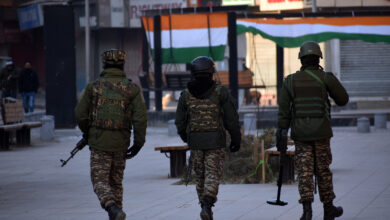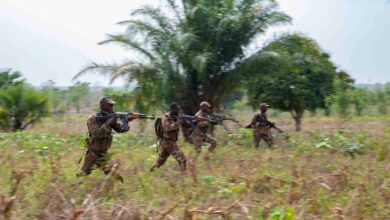Patience: Islamic State’s new-found focus on Sabr
Islamic State’s recent focus on ‘Sabr’ strategy and related matters of faith may suggest efforts to tackle decreased morale and low motivation
For around a year and a half, Islamic State has been shifting its global strategy towards guerilla warfare, conducting more irregular warfare operations rather than defending territory. More specifically, the Sunni jihadist militant group has adopted a strategy called “Sabr” (“patience” in Arabic), a term used by Islamists referring to the religious virtue of steadfastness and resilience.
As a strategy on the ground, Sabr is implemented through a gradual increase of the group’s foothold in a designated area, partly by guerilla warfare tactics and partly by utilizing the support from – and even merging into – the local populace. In terms of its style of warfare, this largely materializes in the form of assassinations of security personnel, the use of improvised explosive devices, ambushes, and car bombs to a lesser degree. Sabr has been traditionally identified with the strategy of al-Qaeda and its affiliates throughout the globe, including in Somalia, West Africa, and Yemen.
Aside from practicing it in areas where the jihadist organization is operating, Sabr is increasingly reflected in Islamic State’s publications and audiovisuals over the past months. These products have been focusing on multiple aspects of Sabr, including psychological, theological, and faith reinforcements.
First, there has been an inflation of usage of the root صبر (Sabr) in the group’s magazines and messages over the past weeks. For instance, in its 159th edition of al-Naba magazine, which was released on December 6, the word صبر /Sabr was used 38 times in various forms. The frequent use of the term is likely meant to ingrain this old-new idea among the group’s fighters and supporters, in order to tackle their mental notion of the previously existing de facto state of the so-called Caliphate.
In light of Islamic State’s loss of territories in Iraq and Syria, this is a necessary shift, as the psychological adaptation of its fighters to the new strategy is equally important to the physical transformation.
Furthermore, the same magazine published an editorial titled “good news for the Saberin” (those who practice Sabr). In the piece, the author brings examples and quotes from Islamic sources discussing the theological aspect of Sabr. The main theme is that Allah places obstacles and challenges in the face of the believer as a test, in which those who remain steadfast (the Saberin), receive a great reward in both this world and in the afterlife. By presenting such religious reinforcements the jihadist organization strives to prevent despair among its militants in the wake of the fall of the physical caliphate.
To further overcome this challenge, ISIS published articles and infographics in an attempt to strengthen its followers’ faith, while tackling the issue of surrendering to despair. An op-ed published in the 160th edition of al-Naba provides examples of difficulties past prophets faced, such as Noah and Jobe, and the way their faith and trust in Allah (Tawakul) enabled them to overcome such hurdles.
In addition, in al-Naba’s 162nd edition, which was released on December 27, an infographic was published detailing the reasons for despair, among which is the over-dependence, or addiction, on the “al-Dunya” (“this world”) and the anxiety of demise, as well as the taking over of fear at the expense of hope. The same infographic also provides the means that the believer could employ to avoid it, including a strong trust in God, positive thinking of Allah, and acknowledging its mercy and power.
The increased focus on Sabr, and by extension on matters of faith and theology, may indicate existing low morale and decreased motivation within the ranks of the Sunni jihadist militant group in light of its setbacks.
By addressing the issue, the organization seeks to mitigate such sentiments among its fighters. Moreover, over the coming weeks and months, in addition to such editorials and infographics discussing the aforementioned religious-psychological matters, it is likely that the Islamic State will intensify the issuance of audiovisuals concerning the alleged success of some of its affiliates. This is highlighted by recent period’s growing focus on its Islamic State West Africa affiliate, which stepped up its attacks in recent months.

Asaf Day is a Middle East and North Africa geopolitical analyst at a private security-consultancy firm. His areas of expertise include Syria, Israel, and the Palestinians, as well as global jihad organizations. Asaf has an MA Degree in Arabic Studies from the University of Bar Ilan and a BA from Ben Gurion University, both in Israel.
In addition to English, Asaf speaks fluent Hebrew and Arabic, as well as Turkish and French to a lesser degree.
All views and opinions expressed in this article are those of the author, and do not necessarily reflect the opinions or positions of The Defense Post.
The Defense Post aims to publish a wide range of high-quality opinion and analysis from a diverse array of people – do you want to send us yours? Click here to submit an Op-Ed.












